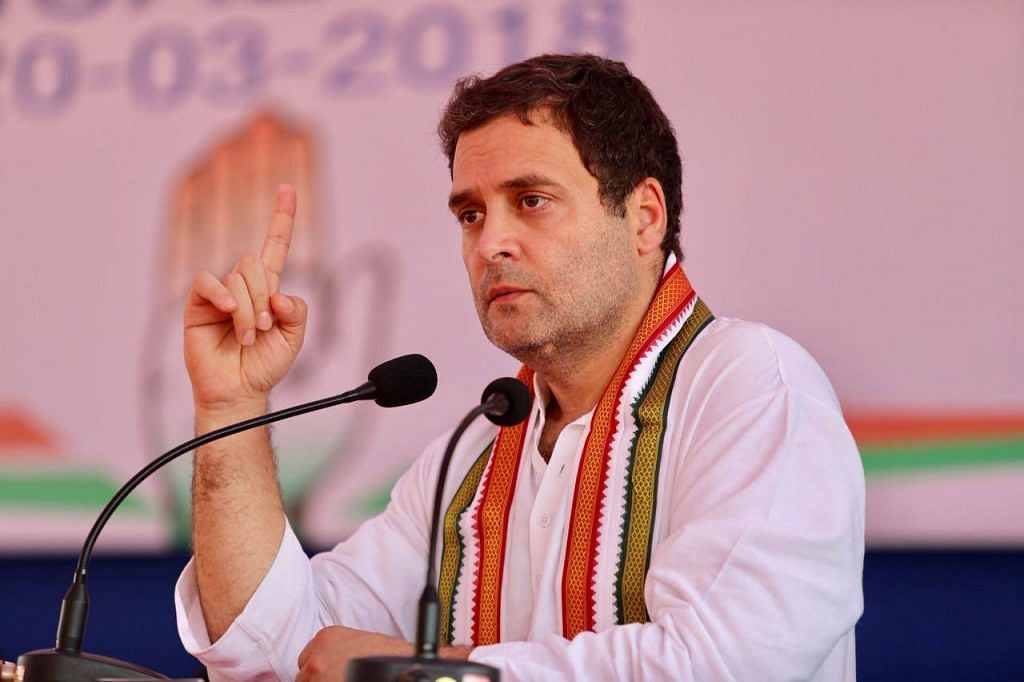New Delhi: Former Congress president Rahul Gandhi was on the backfoot Wednesday as Pakistan used a purported quote of his in its report to a United Nations agency on the “violation of human rights in Kashmir”.
Speaking to reporters after a party meeting earlier this month, Gandhi had referred to “reports of violence… and reports of people dying” in Kashmir.
Pakistan Human Rights Minister Shireen Mazari used this quote to point out in her report that even mainstream Indian politicians have acknowledged acts of violence in Kashmir.
Gandhi was quick to lash out, saying in a tweet Wednesday morning that, while he disagreed with the Modi government on several issues, there was consensus on the fact that Kashmir was an internal matter.
He also seemed to shift the onus of alleged violence in Kashmir to Pakistan.
I disagree with this Govt. on many issues. But, let me make this absolutely clear: Kashmir is India’s internal issue & there is no room for Pakistan or any other foreign country to interfere in it.
— Rahul Gandhi (@RahulGandhi) August 28, 2019
There is violence in Jammu & Kashmir. There is violence because it is instigated and supported by Pakistan which is known to be the prime supporter of terrorism across the world.
— Rahul Gandhi (@RahulGandhi) August 28, 2019
Ever since the abrogation of Article 370, which gave Jammu & Kashmir special status, the Congress has accused the Modi government of shutting down communication in the region and curtailing the civil liberties of people.
Asked if Gandhi’s tweet reflected a change in the party’s stand, a senior Congress leader said no.
“We have not changed our stand at all,” the leader added. “Things in Kashmir are not normal, but that doesn’t mean it’s any of Pakistan’s business.”
Experts say the leadership crisis stalking the Congress since the Lok Sabha polls debacle, coupled with questions about the party’s electoral relevance, have caused it to keep tripping over itself.
ThePrint looks at a few recent instances where the Congress has found itself thrust into chaos over members’ reluctance to toe a party line they found unacceptable.
‘Demonising Modi’
The Congress is staring at a divided house on various fronts when it comes to taking on the BJP, the most recent being its role as an opposition party.
Three senior leaders of the party — Jairam Ramesh, Shashi Tharoor and Abhishek Manu Singhvi — have gone on the record to say that the Modi government has also taken some good initiatives that need to be acknowledged. Others in the Congress have not taken kindly to the view, saying the party’s criticism of the Modi government has always been driven by fair grounds.
Also read: National integration can’t be achieved by tearing apart J&K, says Rahul Gandhi
Article 370
The party’s initial stand on Article 370 triggered a virtual revolt in its ranks.
Former MPs Jyotiraditya Scindia and Deepender Hooda went public with their support for the government’s move even as senior party colleagues like P. Chidambaram were opposing it in Parliament, saying it would lead to “catastrophic consequences”.
At a CWC meeting held earlier this month, the two were joined by Jitin Prasada and R.P.N. Singh in questioning the party line and exhorting the leadership to be cognisant of the public mood.
It was one of the rare occasions when the CWC witnessed a rebellion against the high command’s line. The Congress ultimately tempered its stance to the “unconstitutional manner” in which the decision was taken.
Watering down AFSPA
The Congress manifesto for the 2019 Lok Sabha election promised to water down the Armed Forces Special Powers Act and scrap the sedition law at a time when the Pulwama attack on CRPF personnel and the ensuing air strikes on terror camps in Pakistan had consolidated the nationalist vote in favour of the BJP.
Soon after the Lok Sabha loss, discontent in the party grew. A senior leader who worked on the manifesto said many Congress veterans had opposed the inclusion of the promises, and expressed their resentment after being overruled.
The Congress’ manifesto team was headed by former finance minister P. Chidambaram, and many leaders have targeted him as the force behind the promises.
However, Chidambaram had earlier told ThePrint that the manifesto was “discussed at length and approved” by the Congress Working Committee, the party’s top decision-making body.
Leadership crisis
According to Sanjay Kumar, the director of the Centre for the Study of Developing Societies (CSDS), the Congress’ struggle to find its feet is a consequence of two things — the crippling loss of 2019 and the leadership crisis that followed, with chosen leader Gandhi stepping down as president.
“The Congress has not seen this kind of confusion in at least the last three to four decades,” Kumar said. “The lack of a respectable leader, if not an effective one, at the helm of affairs for nearly 90 days has led to this.”
Kumar added that the situation is worse now than in 2014 as Congress leaders still had hope after that debacle.
“They hoped the Congress would bounce back, but now there’s no telling if the BJP’s dominance will fade,” Kumar said. “They are responding to the mood of the people, that is why there are multiple views, even if they believe in the party’s ideology, they think it’s not electorally viable.”
Also read: Congress slams Pakistan for using Rahul Gandhi’s name in UN petition on Kashmir issue
